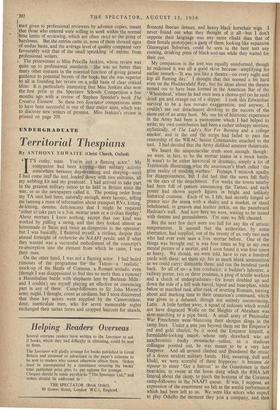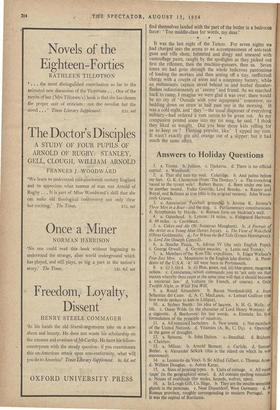UNDERGRADUATE
Territorial Thespians
By ANTHONY THWAITE (Christ Church, Oxford) I 6 T'S cushy, mate. You're just a flaming actor.' My
companion had been kipping—that military activity
somewhere between day-dreaming and sleeping—until I had come inte the tent, loaded down with two suitcases, all my webbing kit and my greatcoat.. I had arrived to take part in the greatest military tattoo to be held in Britain since the war; or so the newspapers called it. The posting order from my TA unit had been, naturally enough, more laconic, telling me (among a mass of information about transport RVs, kitting, de-kitting, denims, deficiencies) that I might be required ' either to take part in a 3-in. mortar team or a civilian display.' About mortars I knew nothing, except that one kind was worked by pulling a string, and that they looked almost as homemade as Stens and twice as dangerous to the operator; but I was basically, I flattered myself, a civilian, despite this annual fortnight of recherche du NAAFI perdu, and if what they wanted was a successful embodiment of the conscript's re-absorption into the element from which he came, I was their man.
On the other hand, I was not a flaming actor. I had heard rumours of the programme for the Tattoo—a ' realistic ' mock-up of the Battle of Corunna, a Roman testudo, even (though I was disappointed to find this no more than a rumour) a Hannibalian battle with 'elephants lent by Bertram Mills: and I couldn't see myself playing an effective or convincing part in any of these. Camp-followers to Sir John Moore's army might, I thought, count as civilians, but I soon discovered that these key actors were supplied by the Cameronians; dour, inarticulate men, who for seven memorable nights exchanged their tartan trews and cropped haircuts for shawls, flounced Iberian dresses, and heavy black horsehair wigs. I never found out what they thought of it all—but I don't suppose their language was any more ribald than that of their female prototypes; a gang of them, looking like expansive Glaswegian fishwives, could be seen in the beer tent any evening, drinking pints of black-and-tan while they waited for their cue.
My companion in the tent was equally uninformed, though he reckoned it was all a gaifid skive because—amplifying his earlier remark—It was just like a theatre—on every night and
kip all flaming day.' I thought that this seemed a bit hard
even on the Huddersfield Rep., but his ideas about the theatre
turned out to have been formed in the American Bar of the Wheatsheaf,' where he had once seen a chorus-girl (so he said) drink gin and orange out of a slipper. I took this Edwardian survival to be a ben trovato exaggeration; and anyway, I couldn't see our detachment drinking to the success of the show out of an army boot. My one bit of histrionic experience in the Army had been a pantomime which I had helped to write; my own contribution had been a rather unhappy mixture, stylistically, of The Lady's Not For Burning and a college smoker, and in the end the script had failed to pass the censorship of the WRAC Senior Commander attached to the unit. I had decided that the Army disliked amateur theatricals.
We heard the unspectacular truth soon .enough, though: we were, in fact, to be the mortar teams in a mock battle. It wasn't to be either historical or dramatic, simply a lot of Territorials illustrating what the announcer's blurb called the grim reality of modern warfare.' Perhaps I mistook apathy for disappointment, but I did feel that the news fell flatly on the ears of the detachment. For weeks the towns nearby had been full of posters announcing the Tattoo, and each poster had shown superb figures in bright and unlikely historical costume. Each of us, I felt, had secretly longed to prance into the arena with a shako and a musket, or stand behelmeted, in greaves and leather jerkin, on the pasteboard Hadrian's wall. And now here we were, waiting to be issued with denims and groundsheets. I'm sure we felt cheated.
But the next few days were too full for any fits of artistic temperament. It seemed that the authorities, by some aberration, had supplied, out of the twenty of us, only two men who had ever even seen a 3-in. mortar before. One of the things was brought out; it was four times as big as my own mental picture of a mortar, and I soon found it was four times as heavy. We should, we were told, have to run a hundred yards with these; set them up; fire as much blank ammunition as we could carry; dismantle them; and run the hundred yards back. So all, of us—a bus conductor, a builder's labourer, a railway porter, two or three postmen, a gang of textile workers and a clutch of undergraduates—for hours doubled up and down the side of a hill with barrel, bipod and base-plate, while below us marched rank after rank of strutting Romans, turning about and marking time to their centurion's command, which was given in a debased, though not entirely unconvincing. Latin. A little further away, a squad of redcoats which would not have disgraced Wolfe on the Heights of Abraham was slow-marching to a pipe band. A small army of Peninsular War Frenchmen were blancoing their shotgun slings in the camp lines. Under a tree just beyond them sat the Emperor's red and gold chariot; by it stood the Emperor himself, a formidable-looking major, whose only drawback was an anachronistic bushy moustache—unless, as a studious colleague pointed out, he was meant to be a very late Emperor. And all around clashed and thundered the music of a dozen strident military bands. Hot, sweating, dull and khaki, we were scornful of these fripperies: it became de rigueur to sneer Get a haircut' to the Guardsmen in their bearskins, to swear at the horse dung which the RHA left littered about the camp, to pinch the bottoms of the Corunna camp-followers in 'the NAAFI queue. It was, I suppose, an expression of the resentment we felt at the sordid performance which had been left to us. We were like actors who expect to play Othello the moment they join a company, and then find themselves landed with the part of the butler in a bedroom farce: Too middle-class for words, my dear.'
* * * It was the last night of the Tattoo. For seven nights we had charged into the arena to an accompaniment of anti-tank guns and rifle shots, helmeted and dingy and smeared with camouflage paint, caught by the spotlights as they picked out first the riflemen, then the machine-gunners, then us. Seven times we had gone through the whole ludicrous pantomime of loading the mortars and then setting off a tiny, ineffectual charge with a couple of wires and a ninepenny battery, while an enthusiastic captain stood behind us and hurled thunder- flashes indiscriminately at `enemy' and friend. As we marched back to camp, I imagine we were glad it was over; there would be no cry of Outside with your equipment' tomorrow, no bedding down on straw at half past one in the morning. It was a cold night, and they '—the usual dispenser of everything military—had ordered a rum ration to be given out. As my companion poured some into my tin mug, he said, ' I think they liked us tonight. Did you hear those kids yelling for us to keep on ? Flaming popular, like.' I sipped my rum. It wasn't exactly gin and orange out of a slipper; but it had much the same effect.



































 Previous page
Previous page